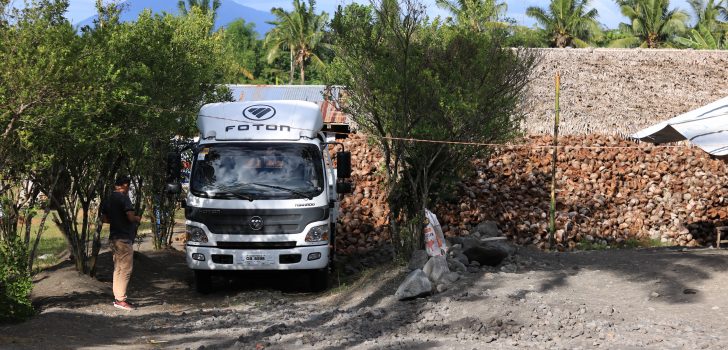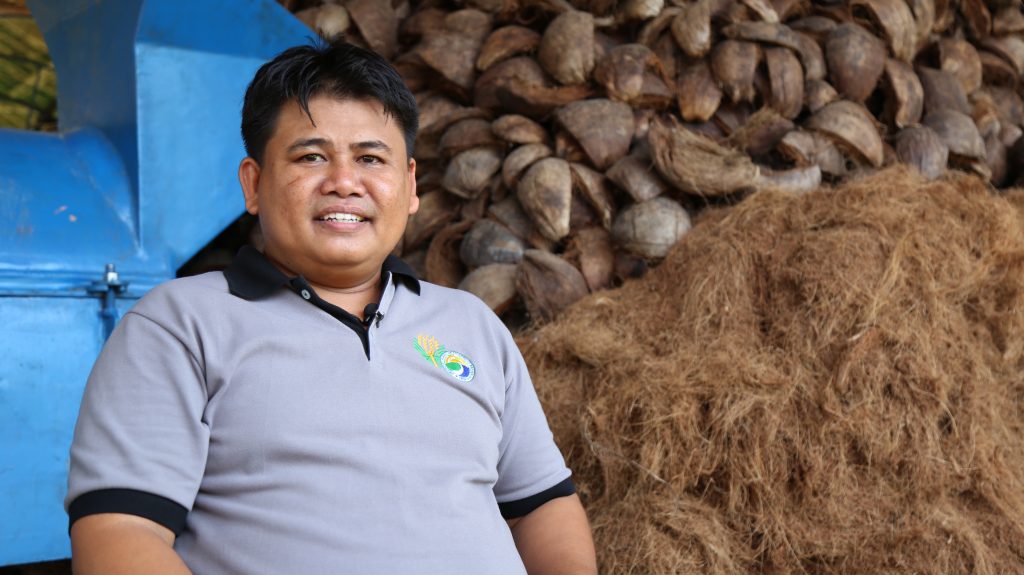 One of the PRDP interventions for the Coco Geonets Manufacturing Enterprise include the establishment of a coco geonet warehouse near the Tunay Tapat Lahing Pilipino Cooperative’s office in Libon, Albay. The cooperative also acquired a forward truck through the PRDP. (Photo by Ana Francesca Chavez)
One of the PRDP interventions for the Coco Geonets Manufacturing Enterprise include the establishment of a coco geonet warehouse near the Tunay Tapat Lahing Pilipino Cooperative’s office in Libon, Albay. The cooperative also acquired a forward truck through the PRDP. (Photo by Ana Francesca Chavez) Albay co-op establishes name in coco geonets industry with PRDP-funded enterprise
“Sa ngayon po, medyo nakikilala na rin po kami dito [ng komunidad] bilang isang samahan sa kooperatiba. Dati-rati po halos hindi kami nakikita (At present, we are somehow being recognized here [by the community] as a group, a cooperative. Before, we were hardly identified),” Josias Pedrocillo, Chairman of the Tunay Tapat Lahing Pilipino Cooperative (TTLPC) shared.
Organized in 2005 and officially registered under the Cooperative Development Authority in 2007, the TTLPC aims to provide services and income-generating projects for its members and the community.
In 2015, the cooperative decided to propose the Coco Geonets Manufacturing Enterprise under the Department of Agriculture’s Philippine Rural Development Project (DA-PRDP) and expand their opportunities since most of the TTLPC members are coconut farmers.
The PRDP-approved enterprise development (I-REAP) subproject of the TTLPC and the Provincial Government of Albay is expected to generate at least 900 new jobs for cooperative members and the community as direct and indirect workers.
Worth P5.8 million, the subproject focuses on the conversion of coconut husks into marketable products such as coir fiber and coco peat. It also includes the production and selling of geonets as raw materials for bio-engineering or erosion control and coco peat as soil conditioner.
By encouraging the community members to sell unwanted coconut husks, the TTLPC’s enterprise also contributes to the protection of the environment.
Coconut husks from trash to cash
According to Pedrocillo, their community considers coconut husks as wastes, which are burned or carelessly thrown away. He added that husks used to crowd at the Bato Lake especially during a typhoon.
“Kahit papaano nakabawas na rin po kami ng problema sa basura ng bunot dito sa amin (In a way, we have helped lessen the problem of coconut husks as a waste in our community),” Pedrocillo added.
The TTLPC collects and buys husks at five cents per piece and contributes to the community waste management. Residents used to willingly give away the husks, but now they would sell it for the said price.
Opportunities for women
The TTLPC also provides opportunities to women by employing them as twiners and paying them P1 per twine.
Lorna Sario, resident of Brgy. Nogpo in Libon, Albay, said, “Wala po [kaming trabaho], sa bahay lang. Mas maiging merong proyekto para nakakatulong sa aming mga kababaihan (We have no job, we just stay at home. It is better that the project is there to help us women).”
Sario used to make 20 twines per day, but with the enterprise’s new equipment, she can now make up to 45 twines a day. She also shared that with the subproject, she can contribute to her family’s daily expenses that include the needed school supplies of her children.
According to Pedrocillo, the cooperative currently studies more project opportunities that would involve the women from the different barangays of Libon, Albay.

Josias Pedrocillo, Chairman of the Tunay Tapat Lahing Pilipino Cooperative (TTLPC), shares the emerging benefits of their PRDP subproject during the I-REAP Impact Assessment held in Libon, Albay. (Photo by Eduardo Collantes, Jr.)
Bigger enterprise, bigger goals
With the subproject status at 79 percent complete, the TTLPC already prepares its plans for the sustainability of the enterprise. According to Pedrocillo, the cooperative wants to become the direct seller of coco geonets among its other products. He said that they will limit transactions with middlemen to further improve the income of the enterprise and its members.
Currently, the TTLPC plans to join bidding opportunities from government agencies like the Department of Public Works and Highways and explore opportunities to improve the quality of products for export.
Pedrocillo stressed that the TTLPC will do its best to make the enterprise successful and prove that the PRDP interventions mean a lot to them. ### (Gumamela Celes Bejarin, DA-PRDP South Luzon PSO InfoACE Unit)
